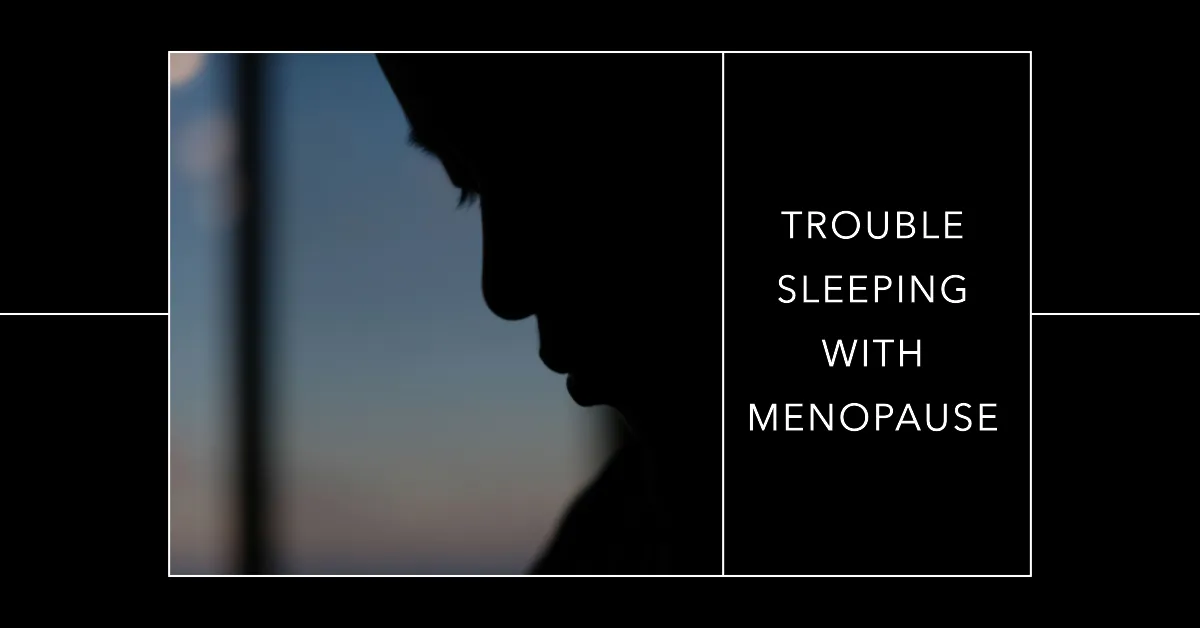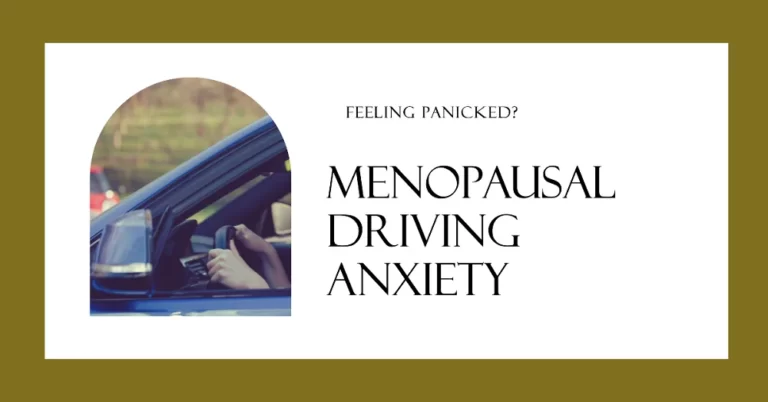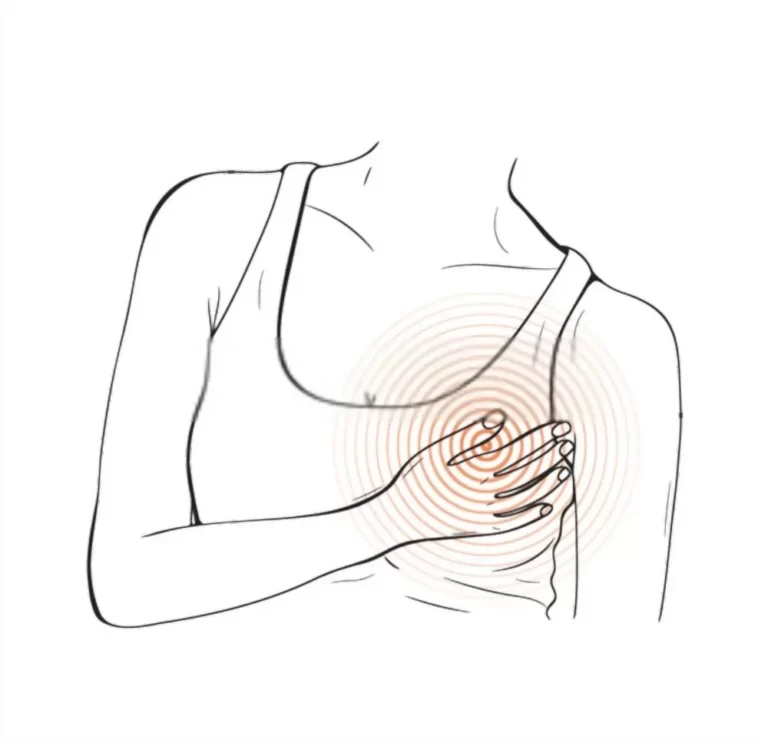Sleep Disturbances In Menopause: Night Sweats To Sweet Dreams
Menopause can feel like a turbulent journey, full of disorienting twists and turns. This natural biological process affects women’s physical, mental, and emotional health.
Perhaps the most frustrating symptom of menopause is the sleep disturbances that can cause a ripple effect on the rest of a woman’s life. Feeling tired and rundown all day, every day can leave you feeling overwhelmed and demotivated.
Sleep deprivation is not fun; if you’re going through menopause, things are about to get bumpy. The main culprits for sleep disturbances during menopause are low levels of female hormones, estrogen, and progesterone, as they help to regulate your body’s biological rhythms, mood, and libido.
The fluctuation of these hormones in menopause can wreak havoc on the body’s internal temperature regulation system, leading to hot flashes and night sweats. The result is a vicious cycle of uncomfortable sleep followed by a sluggish day.
Unfortunately, this can lead to further complications such as irritability, anxiety, depression, and a decreased quality of life. But don’t worry, there are ways to combat these symptoms and get the restful, restorative sleep you need.
We understand every woman is unique, so we offer personalized strategies tailored to your situation. We have numerous options, from lifestyle changes to natural remedies, prescription medications, and hormone therapies.
Let’s explore the science of menopause-related sleep troubles and strategies you can use to manage them. We’ll walk you through the vital information, tips, and tricks to understand menopause’s relationship with the sleep cycle.
Together, let’s get you your sweet dreams back.
What is ‘Good’ Sleep?
So, when was the last time you had a truly restful night’s sleep? Good sleep is often taken for granted, but it is vital to overall health and well-being.
Science has shown that a regular sleep schedule, a comfortable sleep environment, and minimal interruptions during the night characterize quality sleep. Each sleep cycle encompasses stages marked by specific brain waves, body movements, and physiological changes.
These stages are critical for consolidating memories, regulating hormone function, and rejuvenating the body and mind. Hormones play a vital role in sleep, and a lack of sleep can negatively impact hormone levels, leading to mood imbalances, weight gain, and even chronic diseases like diabetes.
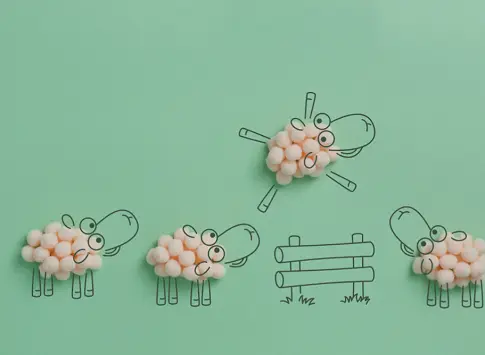
The National Sleep Foundation recommends that adults aim for between 7-9 hours of sleep per night, with individual needs varying. Yet, adequate sleep is not only about duration; it also encompasses factors such as continuity, efficiency, and subjective satisfaction.
Hormonal fluctuations, stress, and medical conditions can all impact sleep quality, making it crucial to prioritize a consistent sleep routine. Like we tell kids to have regular bedtimes, establishing a consistent sleep schedule as adults lets our bodies know when to wind down and enter a restful state.
Menopause and Its Impact on Sleep
As we age, our ovaries gradually lose their ability to produce hormones, particularly estrogen and progesterone. These hormonal changes can trigger a range of symptoms, including vasomotor symptoms (VMS), such as having hot flashes (a sudden rush of warmth spread throughout your body) and night sweats (intense perspiration and flushing at night).

Insomnia affects one in four women and can increase feelings of anxiety and irritability, impair focus and memory, and increase headaches and inflammation. Approximately 75 to 85% of women experience hot flashes around menopause.
As estrogen and progesterone are involved in the body’s circadian rhythms, disruption can lead to insomnia, fatigue, and other sleep disorders. Although menopause is a physiological process that occurs in all women, the timing and severity of its symptoms can vary greatly between individuals.
Recent studies have shed new light on the hormonal changes that occur during menopause, as well as the impact of these changes on sleep patterns. Here are some recent facts about the hormonal changes that occur during menopause:
A decline in Estrogen Levels
As women approach menopause, their ovaries produce less and less estrogen, leading to a range of symptoms, including hot flashes and vaginal dryness. Low estrogen levels can also affect sleep, as this hormone regulates the sleep-wake cycle.
Studies have found that women with lower estrogen levels take longer to fall asleep and experience more awakenings at night.
Decrease in Progesterone Levels
Progesterone is another hormone that declines during menopause and is essential for promoting sleep. This hormone helps calm the brain and promote relaxation, making it easier for women to fall and stay asleep.
Women may experience more insomnia and other sleep disturbances as progesterone levels drop.
Increase in Cortisol Levels
Cortisol is the body’s stress hormone, and during menopause, women may experience an increase in cortisol levels that can disrupt their sleep-wake cycle. This hormone is typically low at night, which allows for restful sleep.
However, in menopausal women, cortisol levels may remain high, leading to insomnia and other sleep disturbances.
Decrease in Melatonin Levels
Melatonin is a hormone that helps to regulate sleep and wakefulness. It is primarily produced at night and promotes a restful night’s sleep.
Melatonin levels decrease with age, and women may experience a further decline during menopause, making it more difficult to fall asleep at night.
Menopause-Related Sleep Disorders: In-depth
If you’re a woman going through menopause, you might have noticed some changes in your sleep patterns. Maybe you’re having trouble falling asleep, staying asleep, or waking up frequently at night.
Perhaps you’re waking up drenched in sweat or gasping for air. These are all symptoms of menopause-related sleep disorders, and it’s important to understand them to get the help you need.
Menopausal sleep disorders can range from mild to severe. And they are often accompanied by depression and anxiety, as estrogen and progesterone affect bodily processes that affect mood, appetite, sleep, sex drive, and more.
These disorders can disrupt sleep, impair cognitive function, and increase the risk of depression, anxiety, and other health issues. However, it is important to note that not all women are affected in the same way, and for some, the symptoms may be mild and barely noticeable.
Here, we will provide an in-depth analysis of the various sleep disorders associated with menopause.
Insomnia: Difficulty Falling and Staying Asleep
Insomnia is a common sleep disorder many women experience during menopause. It is characterized by difficulty falling asleep, staying asleep, or waking up feeling exhausted.
Hormonal changes, stress, anxiety, depression, and other factors can cause insomnia. Estrogen plays a key role in regulating sleep and circadian rhythms. Women going through menopause may experience a decrease in estrogen and progesterone levels, leading to more difficulty falling asleep at night.
They may also wake up frequently throughout the night or feel unrested after sleeping. Insomnia treatment options include cognitive-behavioral therapy (CBT), sleep hygiene practices, and medication.
Sleep Apnea: Interrupted Breathing During Sleep
Sleep apnea is another sleep disorder affecting many women during menopause. During sleep, the airway can become blocked or obstructed, resulting in repeated interruptions in breathing.
This can lead to loud snoring, gasping for air during sleep, and daytime sleepiness. It can worsen considerably during menopause due to hormonal changes that cause the airway to constrict.
Treatment for sleep apnea often involves lifestyle changes, such as quitting smoking and losing weight. It can also involve using a CPAP machine or oral appliances to help regulate breathing during sleep.
Snoring: Loud Snoring During Sleep
Snoring can become more frequent and disruptive during menopause. This is because the hormonal changes associated with menopause cause changes in the throat tissues that can lead to increased snoring.
Snoring occurs due to a narrowing or blockage in the airway that causes vibrations when breathing, leading to excessive noise while sleeping. This can lead to decreased oxygen levels during sleep, disrupting an interrupted night’s rest.
Sometimes, snoring may be related to sleep apnea and require medical treatment. Treatment for this condition may include lifestyle modifications such as maintaining a healthy weight and avoiding alcohol before bed.
It may also require using an anti-snoring device, such as nasal strips or a CPAP machine, to help open the airway during sleep.
Night Sweats: Hot Flashes During Sleep
Night sweats are a common symptom of menopause and can significantly disrupt sleep. Hot flashes result from hormonal changes and can cause sudden and intense heat and sweating, making it difficult to fall asleep and stay asleep.
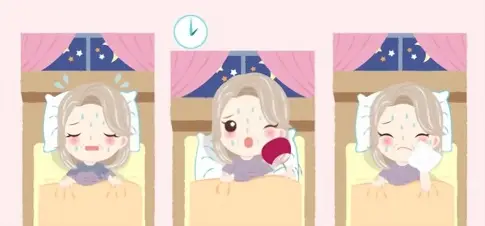
Treatment options include hormone therapy, medication, or lifestyle changes such as avoiding caffeine and alcohol, managing stress, and practicing relaxation techniques.
Restless Leg Syndrome: Uncontrollable Urge to Move Legs
Restless leg syndrome is a prevalent sleep disorder among women experiencing menopause. It’s characterized by an overwhelming urge to move the legs, discomfort or pain in the legs, and interrupted sleep.
Restless leg syndrome (RLS) is a common affliction experienced by many women during menopause. It is characterized by an uncontrollable urge to move the legs, often accompanied by discomfort or aching in the lower limbs.
RLS can cause significant sleep disruption, which can have a detrimental impact on overall health and well-being. Treatment options include medication, lifestyle changes such as regular exercise and a balanced diet, or addressing any underlying medical conditions.
Periodic Limb Movements Disorder: Uncontrollable Twitching of Legs
Periodic limb movement disorder (PLMD) is when the legs experience repetitive and uncontrollable twitching during sleep. It usually occurs in the early stages of sleep, causing repeated awakenings throughout the night.
Hormonal changes can cause PLMD during menopause and other conditions such as thyroid problems or diabetes. Treatment options include lifestyle changes, medications, and addressing any underlying medical conditions.
Effects of Sleep Disturbances on Daily Life
The disruption of sleep patterns is one of the most frustrating symptoms of menopause. Women may experience far-reaching effects from these disturbances that impact their productivity, relationships, and overall quality of life.
Sleep deprivation can lead to irritability, decreased concentration, reduced energy levels, and increased mental health issues such as depression and anxiety. It can also negatively affect relationships with partners and loved ones and job performance.
Physical Health
Insomnia can seriously impact a woman’s physical health. Studies have shown that women who experience sleep disturbances during menopause are at a higher risk for developing cardiovascular disease, obesity, and type 2 diabetes.
Lack of sleep can also weaken the immune system, making women more susceptible to illness and infection.
Cognitive Function
When women experience sleep disturbances during menopause, they may find that their memory, focus, and decision-making abilities suffer. This can impact their ability to function and maintain a productive lifestyle.
During menopause, women who experience sleep disturbances are more likely to experience a decrease in productivity at work. This can be particularly impactful for women in the workplace, who may struggle to meet deadlines or perform at the same level as their well-rested colleagues.
Emotional Health
Sleep disturbances during menopause can also seriously impact a woman’s emotional health. Insomnia is a significant risk factor for depression, anxiety, and other mood disorders.
Additionally, the lack of sleep can lead to irritability, mood swings, and difficulty coping with stress.
Interpersonal Relationships
The impact of sleep disturbances during menopause can extend beyond an individual’s emotional well-being to affect their interpersonal relationships. Irritability, impatience, and mood swings caused by lack of sleep can strain relationships with family, friends, and coworkers.
A decrease in sex drive is also a common effect of insomnia in menopausal women, which can affect relationships.
Productivity
Finally, sleep disturbances during menopause can significantly impact a woman’s productivity. Women who experience sleep disturbances may struggle to perform daily tasks and maintain a productive lifestyle.
How can You Get Better Sleep? Strategies for Coping with Menopause-Related Sleep Disturbances
Menopause can bring some less-than-fun symptoms, like feeling hot and sweaty, mood swings, and struggling to get a good night’s sleep. Lack of sleep can lead to even bigger health issues down the line.
But don’t panic. We got you.
There are tons of ways to boost your sleep quality and make menopause a little less of a pain. Let’s discuss simple strategies to sleep better and stay sane during this transitional time.
Develop a Personalized Sleep Plan
The key to crafting an effective sleep regimen during menopause is determining what works best for you and your body. Developing a personalized sleep plan involves considering a range of factors, including your dietary habits, sleeping environment, and stress levels.
Here are some tips to consider:
- It is important to establish a regular sleep-wake cycle by going to bed and waking up at the same time every day, even on weekends. This can help regulate the body’s internal clock and improve sleep quality.
- Create a relaxing sleep environment by making the room cool, dark, and quiet. Invest in comfortable bedding and pillows made of natural fibers that support good posture.
- Avoid large meals, spicy foods, caffeine, alcohol, and nicotine before bedtime. These can all increase the likelihood of disrupted sleep.
- Incorporate stress-reducing activities, such as meditation, yoga, deep breathing exercises, or reading, into your daily routine.
- Avoid screen time at least an hour before bedtime. The light from screens can interfere with the body’s production of melatonin, a hormone that helps promote sleep.
- Wear soft, comfortable clothing like light robes or breathable pajamas.
- There are various sleep aids and products that can help address these symptoms and promote better sleep. Cooling blankets and sheets help regulate body temperature while room-darkening shades block out light for improved sleep quality.
- Wash your face and hands with cold water to help cool down the body. Take a warm bath or shower before bedtime to relax and calm the mind.
- Soothing smells such as lavender or chamomile can help you relax and unwind. Potpourri, essential oils, a diffuser, or lavender-scented pillowcases are all great options.
Lifestyle Changes
A personalized sleep plan and lifestyle changes can also significantly affect sleep quality during menopause. Sleep like a baby and feel cool as a cucumber with a routine that works for you.

Diet
Maintaining a healthy diet cannot be overstated when it comes to ensuring quality sleep during menopause. A diet rich in whole fruits and vegetables and whole grains can help stabilize blood sugar levels and prevent the spikes and crashes that can lead to insomnia.
To understand the impact of diet on sleep quality, let’s delve deeper into the concept of the glycemic index. This measure of how quickly a food raises blood sugar levels has been shown to impact sleep quality directly.
Foods with a high GI, such as sugary drinks, white bread, and processed snacks, can cause insomnia through spikes and crashes in blood sugar levels, causing symptoms like waking up at night. However, a diet rich in low-GI foods, such as fruits, vegetables, and whole grains, can help regulate blood sugar levels.
According to studies, women who consume a diet high in sugar and high-GI foods are more likely to suffer from insomnia than those who prioritize whole foods. Adding more whole fruits and vegetables to your diet can be as easy as starting your day with a green smoothie or adding more vegetables to your dinner.
On the other hand, it’s important to watch out for added sugars in products such as energy drinks, candy, and sweetened yogurts. Also, limit caffeine intake, especially in the afternoon and evening. Caffeine can interfere with sleep and cause restlessness.
And reduce alcohol consumption, which is a common cause of sleep disruption. By making small changes to your diet and being conscious of your food choices, you can take an important step towards improving your sleep quality during menopause.
Exercise
Maintaining a regular exercise routine during menopause can yield numerous benefits to improve sleep quality. Regular exercise promotes weight regulation, reduces hot flashes, and supports overall health and well-being.
During exercise, our body temperature rises and falls, which helps to regulate our internal clock. Therefore, exercising during the day can help improve sleep quality by causing drowsiness and providing a sense of accomplishment at the end of the day.
It is recommended that women engage in moderate exercise for at least 150 minutes per week. Best to stick with light exercises such as walking or yoga that are low-impact on your body and joints.
Activities such as yoga, walking, and swimming are also ideal as they are low-impact and enjoyable. Yoga and Tai Chi are gentle forms of exercise that promote relaxation and help calm the mind.
Avoid high-intensity exercises such as running or weight lifting late in the afternoon and evening, as this may prevent you from sleeping at night. It’s important to avoid exercising too close to bedtime as it can raise heart rate and body temperature, making it harder to fall asleep.
Stress Management
Stress management is vital for menopausal women to enhance sleep quality. When faced with stress, our bodies produce the hormone cortisol, making it harder to fall asleep and have restful sleep.
Women can try relaxation techniques such as deep breathing, meditation, and progressive muscle relaxation to manage stress. Identifying and addressing the sources of stress is also important. For instance, if work is causing stress, speaking with a supervisor or re-evaluating work-life balance may be necessary. And if a particular situation or person triggers stress, try to create some distance and accept that you cannot control everything.
Laugh more and try to find humor in life. Consider activities that bring you joy, such as listening to music, drawing, or gardening.
Laughing has been proven to reduce stress and help us relax. Being positive and grateful for the little things can help us manage stressful situations more effectively.
Relaxation Techniques and Mindfulness Practices
Relaxation techniques and mindfulness practices can also be effective ways to enhance sleep quality during menopause. Mindfulness meditation has been shown to improve sleep quality in menopausal women experiencing sleep disturbances significantly.
Mindfulness can improve one’s ability to be present and aware, leading to calmness and relaxation that can promote sleep. Women may also benefit from relaxation techniques such as guided imagery, aromatherapy, or reflexology.
It is important to remember that relaxation techniques can take time to learn and master. Therefore, it is best to start slow and practice regularly until you find the technique that works for you.
CBT (Cognitive Behavioral Therapy)
- Identify negative thinking patterns and behaviors related to sleep disturbances.
To help menopausal women improve their sleep quality, CBT identifies thinking patterns and behaviors related to sleep disturbances. These can include thoughts like “I’ll never be able to fall asleep” or behaviors like checking the clock too often.
By becoming aware of these patterns, women can begin to challenge them and replace them with more positive and helpful thoughts and behaviors.
- Develop positive cognitive strategies for dealing with sleep disturbances
CBT also focuses on developing cognitive strategies to deal with sleep disturbances. These strategies include mindfulness practices, progressive muscle relaxation, or cognitive restructuring.
So that women can improve their ability to manage their thoughts and emotions around sleep and reduce anxiety related to sleep disturbances.
- Develop positive behavioral strategies for improving sleep quality
In addition to cognitive strategies, CBT also helps women adopt positive behavioral strategies to improve their sleep. These include setting a consistent sleep schedule, avoiding stimulating activities before bed, and creating a comfortable sleep environment.
- Individualized treatment plans based on each woman’s specific needs
One of the strengths of CBT is that it is highly individualized, with treatment plans tailored to meet each woman’s specific needs. This means that CBT can improve sleep quality for menopausal women, regardless of the severity or duration of their sleep disturbances.
By working with a trained therapist, women can develop a personalized treatment plan that helps them achieve better sleep and improve their overall quality of life.
Natural Remedies and Supplements
Many women turn to natural remedies and supplements to ease menopause symptoms. While some of these options may be effective, consulting with a healthcare provider before use is important.
But, it shouldn’t be the replacement of any medical treatment. Here are some natural and commercial remedies options that you can consider:
- Black cohosh: This herb is commonly used to alleviate hot flashes and other menopause symptoms. While research is inconclusive, some studies suggest it may be effective for some individuals.
- Soy products: Foods that contain soy, such as tofu, soybeans, and soy milk, contain phytoestrogens that may help alleviate hot flashes and other symptoms.
- Ginseng: This herb is commonly used to alleviate stress and boost energy levels. Some studies suggest it may effectively reduce hot flashes and other menopause symptoms.
- Red clover: This herb contains phytoestrogens that may effectively reduce hot flashes and other symptoms. However, the research is inconclusive.
- Chamomile is a popular herb that reduces anxiety and promotes relaxation, while valerian root can relieve tension and help one fall asleep faster.
- Melatonin supplements may also help improve sleep quality during menopause. Melatonin is a hormone that regulates sleep cycles, and some studies suggest that it may be effective in reducing insomnia and other sleep disturbances.
- The NuviaLab Meno food supplement is formulated to counteract the most common symptoms of menopause, including hot flashes, excessive sweating, difficulty sleeping, irritability, decreased libido, or malaise.
- Snoring decreases regeneration during sleep, so people suffering from this affliction don’t fall asleep, have difficulty concentrating during the day, and suffer from headaches and throat and larynx pains. The Snoran Plus supplement is designed to help people combat snoring.
- Insomnia and daytime fatigue are common complaints of people suffering from prolonged negative influences. You can try Restilen, a natural supplement to support and restore sleep in menopausal women.
The susceptibility and adaptation of menopausal symptoms vary, and medication use should always be discussed with a specialist. Consult a healthcare provider before using natural remedies or supplements to ensure safety and efficacy.
Medical Treatments and Therapies
Various medical treatments and therapies are available to manage the hormonal, physical, and psychological changes during menopause. Here are some medical treatments and therapies that can help alleviate menopausal symptoms:
Hormone Replacement Therapy (HRT)
This treatment involves taking estrogen and progesterone to replace the hormones lost during menopause. It can reduce hot flashes, night sweats, vaginal dryness, and other symptoms.
However, it has some risks, such as an increased risk of breast cancer, blood clots, and stroke. Before starting HRT, women should discuss the benefits and risks with their healthcare provider.
Antidepressants
Some antidepressants, such as selective serotonin reuptake inhibitors (SSRIs) and serotonin-norepinephrine reuptake inhibitors (SNRIs), can help reduce hot flashes. They work by affecting the levels of neurotransmitters in the brain.
However, they may have side effects like nausea, dizziness, and sexual dysfunction.
Non-hormonal Medications
Non-hormonal medications such as gabapentin (Neurontin) and venlafaxine (Effexor) can help reduce hot flashes. They do not contain hormones, so they don’t carry the risks associated with HRT.
However, they may have side effects like dizziness, dry mouth, and weight gain. Women should discuss their options with their healthcare provider to determine the best course of treatment for their individual needs.
It is important to note that medical treatments and therapies are not always necessary or appropriate for every woman going through menopause, and lifestyle changes and natural remedies may be enough to alleviate symptoms.
Support and Resources
If you’re experiencing sleep disturbances due to menopause, many resources are available to help you manage your symptoms.
A range of healthcare providers, from primary care physicians to sleep specialists, can offer medical advice and treatment options. Mental health professionals trained in CBT can assist with managing emotional symptoms that may impact sleep, while support groups can offer a sense of community and connection.
National sleep organizations offer numerous resources and educational materials on sleep health for menopausal women. Consider reading books like “The Sleep Revolution” and “The Hormone Cure,” exploring websites like SleepFoundation.org and the NIH Office of Dietary Supplements, or participating in research studies through the North American Menopause Society or Menopause.org.
Seeking professional guidance and support can help you effectively manage menopause-related sleep disturbances.
Did menopause wake me up at 3 am?
It’s possible that menopause could be causing you to wake up at 3 am, as hormonal changes during this time can disrupt sleep patterns. However, there could be other factors at play as well.
It’s also important to consider stress levels, diet, and overall health when determining the cause of insomnia. Consult with a healthcare professional to get an accurate diagnosis and treatment plan.
In the meantime, some helpful tips to promote better sleep include establishing a regular sleep routine, creating a relaxing sleep environment, and avoiding caffeine and alcohol before bed.
Sleep Like a Queen
Menopause-related sleep issues can be challenging and frustrating for women. Even so, many ways exist to help women sleep better during this time.
From lifestyle changes to medication and therapy, some options cater to every individual’s needs. Prioritizing your sleep is crucial to maintaining optimal health and energy levels as you age.
Don’t suffer in silence. Take charge of your sleep and create a plan that works best for you. If you know how, you can enjoy a restful good night’s sleep once again and wake up feeling refreshed, rejuvenated, and ready to tackle the day.
So don’t let menopause rob you of your precious sleep; say goodbye to sleepless nights and reclaim your beauty rest.

